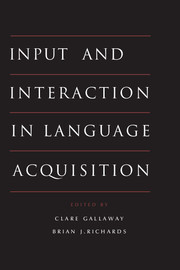Book contents
- Frontmatter
- Contents
- List of figures
- List of tables
- List of contributors
- Preface
- Introduction
- Part I General issues
- 1 The language of primary caregivers
- 2 The changing role of negative evidence in theories of language development
- 3 Crosslinguistic and crosscultural aspects of language addressed to children
- 4 Child-directed speech and influences on language acquisition: methodology and interpretation
- Part II Specific aspects of input and interaction
- Part III Types of language learner
- Conclusion
- References
- Author index
- Subject index
3 - Crosslinguistic and crosscultural aspects of language addressed to children
Published online by Cambridge University Press: 05 June 2012
- Frontmatter
- Contents
- List of figures
- List of tables
- List of contributors
- Preface
- Introduction
- Part I General issues
- 1 The language of primary caregivers
- 2 The changing role of negative evidence in theories of language development
- 3 Crosslinguistic and crosscultural aspects of language addressed to children
- 4 Child-directed speech and influences on language acquisition: methodology and interpretation
- Part II Specific aspects of input and interaction
- Part III Types of language learner
- Conclusion
- References
- Author index
- Subject index
Summary
Introduction
Just as systematic individual differences between children learning the same language have to be accounted for by theories of language development, so differences between languages and between language-learning environments will condition the claims of any theory of language development to universality. Our theories of how children learn language are largely based on the acquisition of English by children from middle-class or upper-middle-class environments in the United States or the United Kingdom. These need to be tested against studies of language development in cultural settings other than those of the middle classes in advanced industrial societies and for languages other than English.
There are two “straw positions'” which can be used to characterize the extremes in approach to crosscultural studies of language development. First is the idea that child-centered “motherese” is universal and therefore, ipso facto, of central importance in children's learning of language. The second is that there are cultures in which speech is never addressed to language-learning children and that therefore it must be possible to learn to talk simply by listening to adults talking to each other. Even if the empirical parts of these two positions were true, the conclusions drawn from them need not be, and, as I shall show in this chapter, they are in fact false. Probably nobody subscribes fully to either position, but stated in this way they demonstrate why looking at language development in a very wide range of cultures is an essential constraint on theory building.
- Type
- Chapter
- Information
- Input and Interaction in Language Acquisition , pp. 56 - 73Publisher: Cambridge University PressPrint publication year: 1994
- 122
- Cited by



